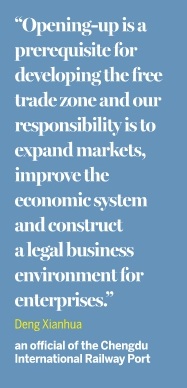Chengdu railway port to be intl hub for logistics
(chinadaily.com.cn) Updated: 2017-05-11 14:28
"To promote the country’s Belt and Road Initiative and strengthen the city’s economic ties with countries along the route, the port aims to be an international hub for logistics, trade and industries," said Deng Xianhua, an official of the administrative committee of the port.
He added the port will improve the global competitiveness of pillar industries under the initiative and enlarge international and domestic logistics services in the next few years.
"Opening-up is a prerequisite for developing the free trade zone and our responsibility is to expand markets, improve the economic system and construct a legal business environment for enterprises," he said.
The 119.99-sq-km free trade zone, launched on April 1, covers areas of Chengdu Tianfu New Area, Chengdu International Railway Port and the southern port area of Sichuan province. By the end of February, the throughput of the Chengdu Railway Container Center Station in the zone had added up to 2.83 million twenty-foot equivalent units.
Earlier this month, the FTZ Chengdu International Railway Port Government Service Hall Single Window area was put into operation.
It aims to further advance international trade by simplifying administrative approval processes and creating a business-friendly environment.
Covering an area of 19,000 square meters, the area offers one-stop services for enterprises in two aspects: administrative approval and trade. To improve efficiency and lower costs, it opens one-to-one windows categorized by business registration, tax and investment.
"The area has integrated a series of administrative resources such as commerce, tax, marketing, planning and construction.
"We will later optimize online services for enterprises and cooperate with institutes covering areas such as customs, tax, national inspection, foreign exchange and banks, to facilitate international trade and back-up service industries," Deng said.
Chengdu’s trade in services industries have reported significant growth over the past few years, due to strong government support and market demand.
Lyu Yuan, director of the Chengdu commission of commerce’s trade in services department, said the city's average year-on-year growth in service sector’s added value reached 10.3 percent during the 12th Five-Year Plan period (2011-15), surpassing the national average by two percentage points.
"The city is taking a leading role in trade in services in central and western China," Lyu said.
Last year, local businesses reported $1.49 billion in revenue from offshore outsourcing service projects.
The city established 13 public service platforms to support 100 offshore outsourcing projects in 2016.
- Xi calls for healthy ROK ties
- Two teams face plants, worms, year of inner space
- China to promote employment of college graduates
- Xi congratulates Moon on ROK election win
- Judicial officials clarify law to fight info theft, fraud
- Xi, Macron have friendly phone call
- China tests new missile in Bohai Sea: Ministry
- 12 killed in E China traffic accident
- Li gets close look at China-made tractor
- New healthcare pricing policy has positive results







